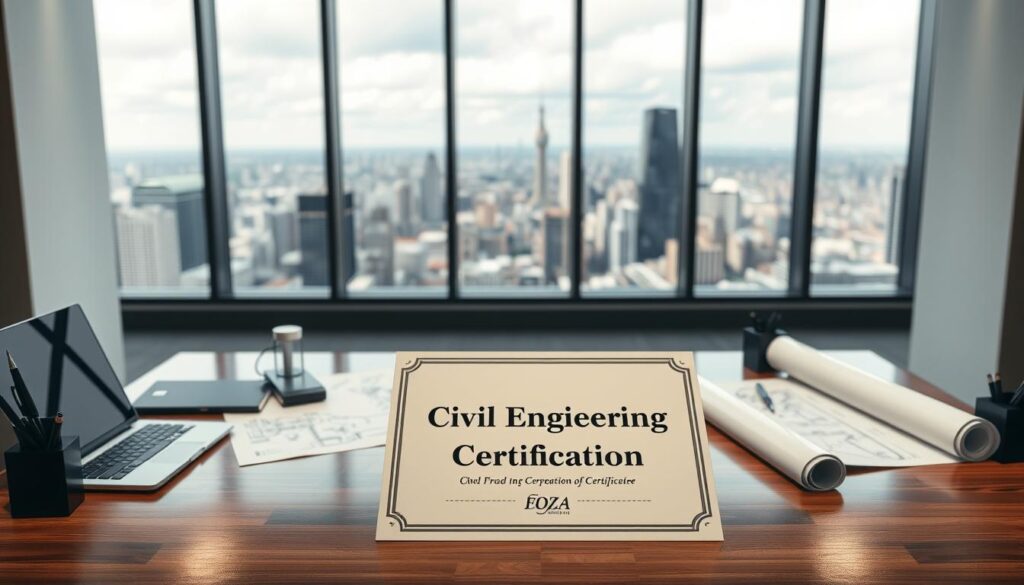The American Society of Civil Engineers (ASCE) emphasizes that board certification benefits not only the public and infrastructure owners but also employers and practicing professionals. This credential signifies advanced knowledge and skills in a specific specialty area, enhancing one’s career prospects.
Obtaining certification demonstrates a commitment to professional development, setting a professional apart in a competitive job market. It is a mark of excellence that reflects a deep understanding and expertise in a particular field of practice.
Key Takeaways
- Certification is a mark of excellence in the field.
- It signifies advanced knowledge and skills.
- Enhances career prospects and professional development.
- Benefits the public, infrastructure owners, and employers.
- Demonstrates commitment to the profession.
What is Civil Engineering Certification?
In the realm of civil engineering, certification plays a pivotal role in validating an engineer’s expertise. It serves as a professional credential that recognizes civil engineers who have demonstrated advanced knowledge and skills in a specific specialty area.
Definition and Importance
Civil engineering certification is defined by the American Society of Civil Engineers (ASCE) as a mark of excellence that signifies an engineer’s expertise in a particular domain. This certification is important because it not only enhances an engineer’s professional credibility but also ensures that they are equipped to handle complex projects safely and efficiently.
The importance of certification can be seen in several aspects:
- Professional Recognition: It provides a recognized standard of competence.
- Career Advancement: Certified engineers often have better job prospects and career advancement opportunities.
- Public Safety: Ensures that engineers are capable of designing and implementing safe infrastructure projects.
Types of Certifications Available
There are various types of certifications available for civil engineers, catering to different specialties and career stages. Some of the most notable certifications include:
- Fundamentals of Engineering (FE) Exam: An initial step for engineers, testing their knowledge in their field.
- Professional Engineer (PE) License: A more advanced certification that signifies a high level of competence and is often required for senior roles.
- Specialty certifications in areas like structural, transportation, and geotechnical engineering.
For those interested in pursuing a chartered civil engineer status, visiting resources like this guide can provide valuable insights into the process.
In conclusion, civil engineering certification is a vital component of a civil engineer’s career, offering numerous benefits and opportunities for professional growth. By understanding the different types of certifications available and their significance, engineers can make informed decisions about their career paths.
Benefits of Civil Engineer Training

The benefits of civil engineer training are multifaceted, enhancing skills, job prospects, and professional networks. By investing in civil engineer training, individuals can significantly advance their careers in the field of civil engineering.
Skill Enhancement
Civil engineer training programs are designed to provide comprehensive knowledge and skills necessary for success in the field. These programs cover a wide range of topics, from structural analysis to project management, ensuring that participants are well-rounded and equipped to handle complex engineering challenges.
Through online civil engineering courses, professionals can acquire new skills without having to take a break from their careers. This flexibility is particularly beneficial for those looking to enhance their expertise in specific areas such as transportation engineering or geotechnical engineering.
Better Job Opportunities
Certificate courses for civil engineers can significantly boost career prospects. By acquiring specialized knowledge and skills, individuals become more attractive candidates for advanced positions, potentially leading to higher salaries and greater job satisfaction.
The best civil engineering courses are those that are recognized industry-wide for their quality and relevance. Completing such a course can open up new job opportunities and provide a competitive edge in the job market.
Networking Opportunities
Civil engineer training also provides valuable networking opportunities. Participants can connect with peers and industry experts, potentially leading to collaborations, mentorship, and access to new career paths.
By engaging in civil engineer training, professionals not only enhance their skills but also expand their professional networks. This combination of skill development and networking can be a powerful catalyst for career advancement.
How to Choose the Right Certification Program
With numerous civil engineering certification programs available, choosing the right one requires careful consideration. The process involves evaluating several factors to ensure the selected program aligns with your career goals and provides the necessary skills and knowledge.
Accreditation and Recognition
One of the critical factors to consider is the accreditation status of the certification program. Accredited civil engineering programs are those that have been reviewed and approved by recognized accrediting agencies, ensuring they meet specific standards. Opting for an accredited program is vital as it directly impacts the certification’s credibility and recognition within the industry.
- Verify the accrediting agency’s reputation and recognition.
- Check if the program is aligned with industry standards.
- Ensure the certification is recognized by potential employers.
Curriculum and Course Content
The curriculum of the certification program should be comprehensive, covering relevant topics and skills required in the civil engineering field. When evaluating the course content, consider whether it includes:
- Fundamentals of civil engineering.
- Specialized courses relevant to your career path.
- Practical training or project-based learning.
Continuing education for civil engineers is crucial, and the right program should offer updated knowledge and skills.
Flexibility and Format of Training
The format and flexibility of the training program are also important considerations. With the rise of civil engineering certification online programs, professionals can now choose between online, offline, or hybrid models based on their needs and preferences.
Consider the following:
- Flexibility in scheduling for online courses.
- Hands-on experience if opting for in-person training.
- Self-paced learning options.
By carefully evaluating these factors, civil engineering professionals can make an informed decision when selecting a certification program that best suits their career aspirations and continuing education needs.
Popular Civil Engineering Certifications in the U.S.

Civil engineering certifications in the U.S. are diverse, catering to various specializations and career goals. These certifications play a crucial role in the professional development of civil engineers, enhancing their skills and job prospects.
Fundamentals of Engineering (FE) Exam
The Fundamentals of Engineering (FE) exam is a critical first step for aspiring professional engineers. It is designed to test their knowledge of engineering fundamentals and is typically taken during the final year of an undergraduate engineering program or shortly after graduation. Passing the FE exam is a significant milestone, as it allows engineers to work under the supervision of a licensed Professional Engineer (PE).
Professional Engineer (PE) License
The Professional Engineer (PE) license is a prestigious credential that signifies a high level of competence in civil engineering. To obtain a PE license, engineers must pass the Principles and Practice of Engineering (PE) exam, which assesses their ability to apply engineering principles to real-world problems. A PE license is often required for senior roles in engineering firms and is essential for engineers who wish to start their own practices.
Other Notable Certifications
In addition to the FE exam and PE license, there are other notable certifications available to civil engineers in the U.S. The American Society of Civil Engineers (ASCE) offers various specialty certifications, such as the Board-Certified Engineer (BCE) credential, which recognizes expertise in specific areas of civil engineering. These certifications demonstrate a commitment to professional development and can significantly enhance an engineer’s career prospects.
By obtaining these certifications, civil engineers can demonstrate their expertise, enhance their career opportunities, and contribute to the advancement of the engineering profession.
Civil Engineering Training Programs Overview
Civil engineering training programs come in multiple formats, catering to the diverse needs of aspiring and current civil engineers. Whether you’re looking to start a career in civil engineering or seeking to advance your existing skills, there’s a program designed to meet your goals.
Degree Programs
Degree programs in civil engineering are comprehensive and structured to provide a thorough understanding of the field. These programs are available at various academic levels, including bachelor’s, master’s, and doctoral degrees. A bachelor’s degree typically covers foundational subjects such as mathematics, physics, and core civil engineering principles. Master’s and doctoral programs allow for specialization in areas like structural engineering, transportation engineering, or geotechnical engineering.
Key Features of Degree Programs:
- In-depth study of civil engineering principles and practices
- Opportunities for specialization through elective courses
- Hands-on experience through projects and internships
- Access to cutting-edge research and technology
Short Courses and Workshops
For those who need targeted training or wish to update their skills, short courses and workshops are an excellent option. These programs are usually shorter than degree programs and focus on specific areas of civil engineering. They are ideal for professionals looking to gain knowledge in a particular area without committing to a full degree program.
Benefits of Short Courses and Workshops:
- Focused learning on specific topics
- Flexibility in scheduling, with many offered online
- Opportunity to network with peers and industry experts
- Enhanced career prospects through specialized knowledge
When choosing a civil engineering training program, it’s essential to consider your career goals and the specific skills you need to acquire. By selecting a program that aligns with your objectives, you can maximize the benefits of your training and advance your career in civil engineering.
Preparing for Civil Engineering Exams

To excel in civil engineering exams, it’s crucial to have a well-structured study plan and access to quality resources. Effective preparation involves a combination of study guides, practice tests, and a thorough understanding of the exam format.
Study Guides and Resources
Study guides are essential for civil engineering exam preparation. They provide a comprehensive overview of the topics covered in the exam and help candidates identify areas where they need to focus their studies. Candidates can find study guides through various sources, including professional engineering organizations and educational institutions.
Some recommended study resources include textbooks, online courses, and study groups. Textbooks offer in-depth knowledge on specific topics, while online courses provide flexibility and interactive learning experiences. Study groups, on the other hand, allow candidates to collaborate with peers, share resources, and stay motivated.
Importance of Practice Tests
Practice tests are a critical component of civil engineering exam preparation. They help candidates assess their knowledge, identify weak areas, and become familiar with the exam format. Regular practice testing can significantly improve a candidate’s confidence and performance on the actual exam day.
Practice tests can be found through the same sources as study guides, including professional organizations and educational institutions. It’s advisable to use a mix of practice tests to simulate the actual exam experience fully.
The Role of Continuing Education
The importance of continuing education for civil engineers cannot be overstated in today’s fast-paced engineering landscape. As the field continues to evolve with new technologies and methodologies, the need for ongoing education becomes increasingly crucial.
Staying Updated with Industry Standards
Civil engineers must stay updated with the latest industry standards to ensure their work is compliant and of high quality. This involves participating in continuing education programs that focus on current developments and future trends. For instance, the American Society of Civil Engineers (ASCE) offers various resources, including webinars and online courses, designed to support professional development.
By engaging with these resources, civil engineers can enhance their skills and knowledge, staying competitive in a rapidly changing job market. For more insights on the importance of continuing education, visit this informative blog post.
Professional Development Resources
A variety of resources are available to support the professional development of civil engineers. These include:
- Online courses and certification programs
- Workshops and seminars
- Professional conferences and networking events
Utilizing these resources can help civil engineers stay current with industry advancements and expand their professional networks. By committing to lifelong learning, civil engineers can achieve greater career success and contribute to the development of innovative infrastructure projects.
Costs Associated with Certification

Civil engineering certification is a significant investment, with costs that extend beyond tuition fees. Aspiring civil engineers should be aware of the various expenses involved in obtaining a certification that can significantly enhance their career prospects.
Tuition Fees
Tuition fees are a major component of the overall cost for civil engineering certification programs. These fees can vary widely depending on the institution offering the program, the location, and the specific certification being pursued. For instance, programs offered by reputable institutions like the San Diego State University may have different fee structures.
Additional Expenses
Beyond tuition fees, there are several additional expenses that candidates should consider. These include the cost of study materials, exam fees, and any additional courses or workshops that may be required as part of the certification process. The American Society of Civil Engineers (ASCE) provides resources that can help estimate these costs.
It’s also worth noting that some certifications may require ongoing education or professional development to maintain certified status, which can incur further costs. However, these investments are crucial for staying updated with industry standards and advancing one’s career in civil engineering.
By understanding the full scope of costs associated with civil engineer training and certification, professionals can make informed decisions about their career paths and financial planning.
Financial Aid and Scholarships
Aspiring civil engineers can explore a range of financial aid and scholarship opportunities to fund their education and training. Civil engineer training and civil engineering certification can be costly, but various organizations offer support to help bridge the financial gap.
Several government agencies and engineering organizations provide scholarships to civil engineers. These scholarships can be a significant source of funding for those pursuing online civil engineering courses or traditional degree programs.
Scholarships by Government Agencies
Government agencies offer various scholarships to support students and professionals in the field of civil engineering. For instance, the Federal Highway Administration (FHWA) and the Department of Transportation provide financial assistance to students pursuing civil engineering degrees.
Scholarships from Engineering Organizations
Engineering organizations, such as the American Society of Civil Engineers (ASCE), offer scholarships to civil engineering students and professionals. The ASCE provides numerous scholarships ranging from $2,500 to $10,000 for students pursuing a degree in civil engineering or a related field.
These scholarships not only provide financial support but also recognize and reward academic excellence and professional potential in the field of civil engineering.
Career Paths in Civil Engineering

Civil engineers have a wide range of career opportunities to choose from, each with its unique challenges and rewards. The field is diverse, with various specializations that cater to different interests and skills. Whether you’re interested in designing infrastructure, managing construction projects, or ensuring the safety of buildings, there’s a career path in civil engineering that’s right for you.
Structural Engineering
Structural engineers play a crucial role in designing and analyzing the structural components of buildings, bridges, and other infrastructure projects. They ensure that structures can withstand various loads and stresses, making them safe for use. To become a structural engineer, you typically need to complete civil engineering training programs that focus on structural analysis and design.
Some of the key responsibilities of structural engineers include:
- Analyzing structural data to identify potential risks
- Designing structural components using specialized software
- Collaborating with architects and contractors to ensure compliance with building codes
Transportation Engineering
Transportation engineers are responsible for designing and maintaining transportation systems, including roads, highways, airports, and public transit systems. They work to improve the safety, efficiency, and sustainability of transportation infrastructure. Civil engineer training programs that focus on transportation engineering can provide you with the necessary skills and knowledge to succeed in this field.
| Transportation Engineering Specializations | Key Responsibilities |
|---|---|
| Highway Design | Designing safe and efficient highways |
| Traffic Management | Optimizing traffic flow and reducing congestion |
| Public Transit Systems | Designing and implementing public transportation systems |
Geotechnical Engineering
Geotechnical engineers study the behavior of earth materials and apply their knowledge to design and construct foundations, tunnels, and other underground structures. They play a critical role in ensuring the stability and safety of infrastructure projects. To become a geotechnical engineer, you typically need to complete best civil engineering courses that cover topics such as soil mechanics, rock mechanics, and foundation engineering.
Some of the key challenges faced by geotechnical engineers include:
- Analyzing soil and rock samples to determine their properties
- Designing foundations that can support heavy loads
- Mitigating the risks associated with natural hazards like earthquakes and landslides
Job Market Trends in Civil Engineering
Civil engineering certification plays a crucial role in the current job market trends. As infrastructure projects continue to grow, the demand for skilled and certified civil engineers is on the rise.
Demand for Civil Engineers
The demand for civil engineers is influenced by various factors, including government infrastructure spending and private construction projects. According to the American Society of Civil Engineers (ASCE), there is a significant need for civil engineers to work on infrastructure projects across the United States.
Infrastructure Development is a key driver of this demand, with projects ranging from road construction to water treatment facilities. Civil engineers with the right certification and training are well-positioned to take advantage of these opportunities.
Impact of Technology on the Field
Technology is transforming the field of civil engineering, with advancements in areas like Building Information Modeling (BIM) and Geographic Information Systems (GIS). These technologies enhance the efficiency and accuracy of civil engineering projects.
The integration of technology in civil engineering also requires professionals to stay updated with the latest tools and methodologies through continuing education for civil engineers. This not only improves their skills but also makes them more competitive in the job market.
As the field continues to evolve, the role of civil engineers will become even more critical in shaping the future of infrastructure and construction. By obtaining the right certification and staying abreast of technological advancements, civil engineers can look forward to a promising career.
Tips for Successful Certification

The journey to civil engineering certification involves several key steps, including goal setting and staying current with industry developments. To achieve this certification, civil engineers must be proactive in their professional development.
Setting Goals and Timelines
Setting clear goals and timelines is crucial for successful certification. It is essential to identify what you want to achieve and by when, creating a roadmap for your certification journey. Here are some tips to consider:
- Create a study plan that outlines what topics to cover and when.
- Set realistic milestones and deadlines.
- Regularly review and adjust your plan as needed.
Keeping Up with Industry Changes
The civil engineering field is constantly evolving, with new technologies and standards emerging regularly. To stay certified, professionals must keep up with these changes. The American Society of Civil Engineers (ASCE) provides resources and guidance on maintaining certification and staying current with industry developments.
Some strategies for staying updated include:
- Participating in continuing education courses and workshops.
- Attending industry conferences and seminars.
- Engaging with professional organizations and networking with peers.
By following these tips and staying committed to their goals, civil engineers can successfully achieve and maintain their certification, advancing their careers and contributing to the field’s ongoing development.
The Importance of Professional Organizations
Professional organizations play a vital role in the development and success of civil engineers. These organizations offer a platform for engineers to connect, share knowledge, and stay updated on industry advancements.
Networking Opportunities
One of the significant benefits of joining professional organizations is the networking opportunities they provide. Civil engineers can connect with peers, mentors, and potential employers, expanding their professional network. According to ASCE, being part of a professional organization can significantly impact one’s career trajectory.
Resources and Support for Engineers
Professional organizations also offer a wealth of resources and support for engineers. This includes access to continuing education courses, industry publications, and professional development opportunities. For instance, members can participate in online civil engineering courses to enhance their skills and stay current with industry standards.
“Membership in a professional organization is an investment in your career, providing you with the tools, knowledge, and connections needed to succeed.”
The benefits of joining a professional organization can be summarized as follows:
| Benefit | Description |
|---|---|
| Networking | Opportunities to connect with peers and industry leaders |
| Professional Development | Access to continuing education and training programs |
| Resources | Industry publications, research, and job listings |
By participating in professional organizations, civil engineers can enhance their careers, contribute to the advancement of the field, and stay connected with the latest developments in civil engineering certification and training.
Challenges in Civil Engineering Training

Pursuing civil engineering certification is a demanding endeavor that necessitates balancing professional obligations with academic commitments. Civil engineers must navigate a complex landscape of technical knowledge, practical experience, and regulatory compliance.
Balancing Work and Study
One of the primary challenges faced by civil engineers in training is balancing work and study. Many are already employed in the field and must juggle their job responsibilities with the demands of further education. This can be particularly difficult for those working on complex projects or with demanding work schedules.
To overcome this challenge, civil engineers can employ several strategies, including:
- Creating a detailed study schedule that aligns with their work commitments
- Utilizing continuing education resources that offer flexible learning options, such as online courses
- Seeking support from colleagues and mentors who can provide guidance and advice
Managing Stress and Expectations
Managing stress and expectations is another critical aspect of civil engineering training. The pressure to perform well on certification exams, combined with the demands of daily work, can be overwhelming. It’s essential for civil engineers to develop effective coping mechanisms and maintain a healthy work-life balance.
The American Society of Civil Engineers (ASCE) and other professional organizations offer resources and support to help candidates manage these challenges. By leveraging these resources, civil engineers can better navigate the stresses associated with certification and continue to grow professionally.
By understanding the challenges inherent in civil engineering training and employing effective strategies, candidates can successfully navigate their certification journey and achieve their professional goals.
Success Stories from Certified Engineers

The American Society of Civil Engineers (ASCE) features numerous success stories from certified engineers, showcasing their contributions to major projects and the impact they’ve had on the field.
Notable Achievements
Certified engineers have achieved remarkable success, with many receiving awards for their work. For instance, some have been recognized for their innovative approaches to sustainable infrastructure, while others have been honored for their contributions to large-scale construction projects.
- Improved project management skills through civil engineer training, leading to more efficient project execution.
- Enhanced technical skills, enabling them to tackle complex engineering challenges.
- Greater recognition within their organizations and the industry, thanks to their civil engineering certification.
Contributions to Major Projects
Many certified engineers have played crucial roles in significant infrastructure projects, including bridges, highways, and buildings. Their expertise has been invaluable in ensuring the success and safety of these projects.
- Designing and implementing innovative solutions, such as advanced drainage systems and sustainable building materials.
- Leading teams and collaborating with other professionals to achieve project goals.
- Utilizing their knowledge of the best civil engineering courses to stay updated on the latest industry standards and technologies.
These success stories highlight the importance of civil engineering certification and the positive impact it can have on one’s career and contributions to the field.
Future of Civil Engineering Certifications

Civil engineering certifications are on the cusp of a revolution, driven by innovations in standards and technologies. As the field continues to evolve, it’s essential for certification programs to adapt and address emerging trends.
Evolving Standards and Technologies
The civil engineering landscape is being transformed by advancements in technology, including the use of Building Information Modeling (BIM), Geographic Information Systems (GIS), and Internet of Things (IoT) devices. These technologies are not only changing the way civil engineers work but also the skills they require. Certification programs must incorporate training on these technologies to ensure that professionals are equipped to tackle modern challenges.
According to the American Society of Civil Engineers (ASCE), “The future of civil engineering is closely tied to the adoption of new technologies and innovative practices.” [1] This underscores the need for certification programs to stay abreast of these developments.
The Role of Sustainability in Certification Programs
Sustainability is becoming increasingly important in civil engineering, with a growing focus on environmentally friendly practices and sustainable infrastructure. Certification programs are beginning to incorporate sustainability principles, recognizing its critical role in the future of the field.
A quote from the ASCE highlights the importance of sustainability:
“Sustainability is a key component of the civil engineer’s role in creating a better future for all.”
This emphasizes the need for certification programs to prioritize sustainability.
Some key areas where sustainability is being integrated into certification programs include:
- Green building practices
- Sustainable materials and resources
- Resilience and adaptation to climate change
By focusing on these areas, certification programs can help ensure that civil engineers are equipped to design and implement sustainable solutions.
Conclusion: Start Your Journey Today
Pursuing civil engineering certification is a significant step towards advancing your career in this field. With the right training and resources, you can enhance your skills, improve job prospects, and stay updated with industry standards.
To get started, explore the various civil engineer training programs and online civil engineering courses available. These resources can help you prepare for certification exams and provide ongoing professional development.
Resources for Further Exploration
The American Society of Civil Engineers (ASCE) offers a range of resources, including webinars and online courses, to support your career in civil engineering. Utilize these resources to stay current with industry developments and best practices in civil engineering certification.
Embarking on this journey will not only boost your professional credentials but also contribute to the advancement of the civil engineering field. Take the first step today towards achieving your career goals.
